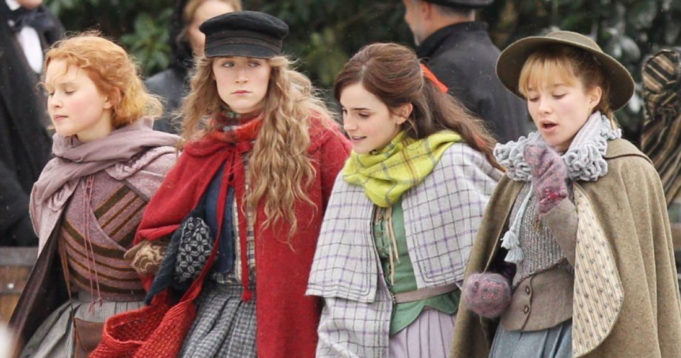We now have five Hollywood feature film adaptations of Little Women stretching back to 1933, to say nothing of other media that include a pretty good opera and a really bad Broadway musical. I myself am an intolerant partisan of Gillian Armstrong’s 1994 film studded with future stars (Christian Bale! Kirsten Dunst! Claire Danes!) and a slow, patient rhythm that builds up power. Yet I must admit that Greta Gerwig’s new version of Louisa May Alcott’s novel is potent stuff. If you somehow weren’t convinced that Gerwig was a filmmaker to reckon with after her 2017 directing debut Lady Bird, be convinced now.
She plunks us down in the middle of the story, with Jo March (Saoirse Ronan) already in New York supporting her family as a fiction writer, Amy (Florence Pugh) in Paris studying art at the behest of rich Aunt March (Meryl Streep), and Meg (Emma Watson) in Concord, Mass., trying to scrape a living as a married mother of two. If you like the parts of the book that take place before this, fear not: Flashbacks show us all the familiar incidents — Jo selling her hair to pay for Marmee (Laura Dern) to travel to Washington, Amy burning Jo’s stories, Beth (Eliza Scanlen) narrowly escaping death from scarlet fever before succumbing to a later illness.
The structure of the film allows Gerwig to juxtapose incidents to illuminating effect; we see Aunt March tell Amy to marry a rich man just before the later scene when Amy informs her that she’s not marrying wealthy English businessman Fred Vaughn (Dash Barber). We’re familiar enough with the material that it can take a fragmented approach like this.
The main purpose is to introduce a welcome layer of metafiction onto this narrative; Jo turns out to be writing the story that will become Alcott’s novel. When characters write letters to one another, the author of the letter reads the text while facing the camera. (Gerwig steals this device and much else from Martin Scorsese’s The Age of Innocence, because good filmmakers know where to steal from.) When Jo’s New York publisher (Tracy Letts) peremptorily demands that the heroine of her story marry someone, we’re given an incredibly over-the-top fake ending with Jo pledging her love to Professor Bhaer (Louis Garrel). Without adding up to an in-your-face postmodern riff on the story, these techniques serve to freshen this well-worn narrative.
No surprise that the best thing about an actor-turned-director’s film is the acting. What surprises me is how shrewdly the actors have been cast to add up to more than the considerable sum of their parts. (Here’s where I note that in this version of a quintessentially American story, not one of the March sisters is played by an American actress.) Watson’s cool radiance, Ronan’s rambunctious discontent, and Pugh’s mix of exuberance and petulance are all given multiple opportunities to play off one another. As Laurie, Timothée Chalamet brings his own theatrical streak as he plays scenes opposite different individual sisters, and the scene in which he proposes to Jo only to be turned down is little short of awe-inspiring. Even the smaller roles are decked out well, with Chris Cooper a luxurious touch as the gruff-but-kind Mr. Laurence and Bob Odenkirk as Mr. March, a casting that sounds like it should fail but works. All this brings the bustle of the March house to life in a unique way.
Even more distinguished about this version is how Amy is handled. Where other versions often treat her like a spoiled airhead, this Amy is deadly serious about wanting to be a famous painter, and she’s crushed when the art on display in Paris shows her that she doesn’t have the talent to do that. Pugh is having herself a year, having played quite different lead roles in Fighting With My Family and Midsommar, and she injects the role with a steeliness that I don’t recall from any other Amy March that I’ve seen.
I’ve never seen a Little Women that made Meg March interesting, and if this one doesn’t exactly pull off the trick, Gerwig does at least have her stand for all the women whose goal in life actually is to get married and have kids. The late section of the film dealing with Jo’s last days with Beth is deeply moving, not least because Beth’s suggestion inspires Jo to write her book. Indeed, as Jo sits alone in her attic, the words start coming so thick and fast that her right hand tires out and she switches to writing with her left. (Writing is a notoriously difficult activity to make cinematic, but Gerwig pulls off the trick.) It’s somewhat less inspiring near the end when Jo negotiates to maintain control of her copyrights, but Alcott would have appreciated her practicality. The real ending is a masterful montage of Jo seeing her novel go through all the steps of being printed. For all the tweaks she has given Alcott’s book for the sake of modernity, this is a great way for Gerwig to demonstrate her fidelity to the written word.
Starring Saoirse Ronan, Emma Watson, and Florence Pugh. Written and directed by Greta Gerwig, based on Louisa May Alcott’s novel. Rated PG.










